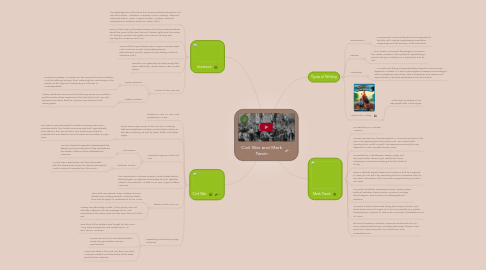
1. Literature
1.1. The types/genres of literature that were produced during the civil war were action, Adventure, Comedy, Horror, Fantasy, Historical, Historical fiction, crime, Magical realism, Mystery, Paranoid, Philosophical, Political, Romance, Satire, (Etc.)
1.2. Some of the major and political issues at the time were questions about the name of the war, the tariff, states' rights and the nature of Abraham Lincoln's war goals. For more on naming, see Naming the American Civil War.
1.3. Some of the major themes were Unique American style, First American novels, Post-independence, Revolutionary period, Topics of early writing, Colonial literature, (Etc.)
1.4. Spirituals are generally Christian songs that were created by African slaves in the United States.
1.5. Writers of the Civil War
1.5.1. Emily Dickinson
1.5.1.1. Dickinson’s poetry is a reverie on the universal human condition in all its suffering and joy; thus, refraining from remarking on the politics of the day and commenting on the war is understandable.
1.5.2. William Faulkner
1.5.2.1. William Faulkner’s The Sound and the Fury serves as a Southern post-traumatic stress response to the loss of the Civil War and expresses his sense that the country never became fully reintegrated.
2. Civil War
2.1. Started on April 12, 1861 and endedMay 9, 1865
2.2. There were many causes of the civil war, including differences between northern and southern states on the idea of slavery, as well as trade, tariffs, and states rights.
2.2.1. This was an issue because the North's economy was more industrial while the South's economy was built agriculturally and relied on the use of slaves. The North wasn't able to understand it and saw the use of humans for free labor a major issue.
2.3. Important Figures in the Civil War
2.3.1. John Brown
2.3.1.1. He and a band of vigilantes helped spark the Bleeding Kansas crisis when they slaughtered five border ruffians at the Pottawatomie Massacre.
2.3.2. Abraham Lincoln
2.3.2.1. Lincoln was a Republican and was associated with the abolitionist cause, his election prompted South Carolina to secede from the Union.
2.4. The Homestead Acts were several United States federal laws that gave an applicant ownership of land, typically called a "homestead", at little or no cost. It gave settlers 160 acres
2.5. Effects of the Civil War
2.5.1. The South was placed under military rule and divided into military districts. Southern states then had to apply for readmission to the Union.
2.5.2. Slavery was effectively ended. While slavery was not officially outlawed until the passage of the 13th amendment, the slaves were set free upon the end of the war.
2.6. Interesting Facts that you may not know
2.6.1. One-third of the soldiers who fought for the Union Army were immigrants, and nearly one in 10 was African American.
2.6.2. Lincoln was shot at—and almost killed— nearly two years before he was assassinated.
2.6.3. More men died in the Civil War than any other American conflict, and two-thirds of the dead perished from disease.
3. Types of Writing
3.1. Romanticism
3.1.1. a movement in art and literature that originated in the late 18th century, emphasizing inspiration, subjectivity, and the primacy of the individual
3.2. Realism
3.2.1. ... is an artistic movement that began in France in the 1850s. Realism is the quality of representing a person, thing, or situation in a way that is true to life.
3.3. Naturalism
3.3.1. ... is a style and theory of representation based on the accurate depiction of detail. It is also a philosophical viewpoint according to which everything arises from natural properties and causes, and supernatural or spiritual explanations are discounted.
3.4. Local Color Writing
3.4.1. ...is the style of writing in the way people talk in the region.
